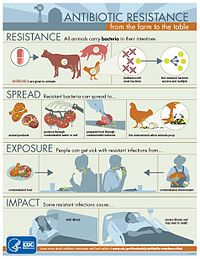
Photo from wikipedia
Simple Summary The increasing popularity of food products from farmers’ markets among consumers has been attributed to their belief that such food is more likely to be organic and free… Click to show full abstract
Simple Summary The increasing popularity of food products from farmers’ markets among consumers has been attributed to their belief that such food is more likely to be organic and free of harmful chemicals. The study’s objective was to measure antibiotic residues in “antibiotic-free” products sold at farmers’ markets in East Tennessee. We purchased “antibiotic-free” beef, egg, and honey products from farmers’ markets in East Tennessee and tested them for tetracycline, sulfonamide, and erythromycin residues. All tested food products contained varying levels of antibiotic residues. Median concentrations of these residues were below the maximum residue levels set in the U.S. for beef and eggs, indicating that these products are considered safe for consumption. But no residue limit has been set for honey products in the U.S. Because these “antibiotic-free” products should not have contained residues given their label, further research is necessary to determine the source of the residues in these foods. Abstract Foods that contain antibiotic residues have potential adverse health effects on consumers and provide selective pressure for the threat of antimicrobial resistance (AMR). This study’s objective was to measure tetracycline, sulfonamide, and erythromycin residues in beef, eggs, and honey sold as “antibiotic-free” at farmers’ markets in East Tennessee (East TN) in the United States (U.S.). Between July and September 2020, 36 “antibiotic-free” food products (9 beef, 18 egg, and 9 honey products) were purchased from East TN farmers’ markets and tested for tetracycline, sulfonamide, and erythromycin residues using competitive enzyme-linked immunosorbent assays (cELISA). All beef, egg, and honey products had tetracycline residue; the median concentrations were 51.75, 30.25, and 77.86 µg/kg, respectively. Sulfonamide residue was present in every sample of beef. Of 18 eggs, 11 eggs had detectable sulfonamide residue; the median concentrations were 3.50 and 1.22 µg/kg in beef and eggs, respectively. Each sample of beef and honey contained erythromycin residue; the median concentrations were 3.67 and 0.68 µg/kg, respectively. Overall, the median concentrations of tetracycline, sulfonamide, and erythromycin residues were below the maximum residue levels (MRLs) set in the U.S. for beef and eggs. Thus, the beef and eggs sold as “antibiotic-free” in East TN farmers’ markets can be considered safe for consumption. Safety determination for honey could not be made because MRLs have not been set for honey in the U.S. Because these residues should not be expected in “antibiotic-free” food products, it is important to further investigate the potential sources of these residues in these products.
Journal Title: Veterinary Sciences
Year Published: 2023
Link to full text (if available)
Share on Social Media: Sign Up to like & get
recommendations!